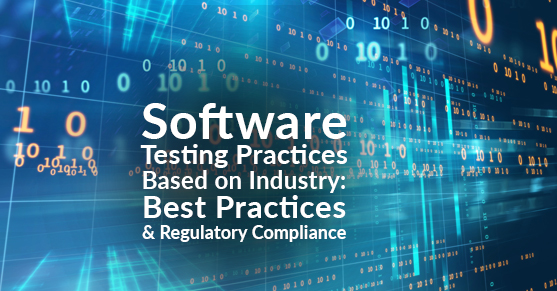Software testing is a crucial activity that helps ensure the delivery of quality software that meets the needs of specific industries. In today’s technology-driven world, most businesses rely on software to operate efficiently, and ensuring that the software meets industry-specific regulatory standards and requirements is of utmost importance.
Software Testing Best Practices:
Adopting best practices when conducting software testing is essential across different industries. The testing process should start from the earliest design stage and continue throughout the entire software development lifecycle. By doing so, potential issues or bugs can be caught and fixed early, thereby reducing costs and increasing efficiency.
Using a formal test management process, including test planning, design, execution, and reporting, helps ensure that the testing process is systematic and consistent. Additionally, testing teams should use the right combination of manual and automated testing techniques to increase efficiency and reduce testing time.
Another best practice is to use risk-based testing, which is a testing practice that prioritizes testing based on the software’s criticality and the perceived risk of failure.
Regulatory Compliance:
Each industry has unique regulatory requirements, and software testing practices must be tailored accordingly to ensure that regulatory compliance is maintained. Below are some examples of regulatory compliance in specific industries:
Banking:
For the banking industry, software testing must comply with regulations such as the Payment Card Industry Data Security Standard (PCI-DSS), Sarbanes-Oxley Act (SOX), and the Health Insurance Portability and Accountability Act (HIPAA).
To meet these compliance requirements, testing teams need to validate the software’s functionality, reliability, and security. The testing team must have a clear understanding of the regulatory requirements, policies, and procedures to be followed when testing software, and they should adhere to these practices during testing.
Healthcare:
In the healthcare industry, software testing must comply with regulatory standards such as the Food and Drug Administration (FDA) and HIPAA. These standards ensure compliance with patient data privacy, security, and patient safety.
Testing teams need to validate the software’s accuracy, reliability, and security to comply with these standards. The testing team must also take into consideration the diversity of users’ needs, such as disabled or elderly patients, and ensure that the software addresses those needs.
Manufacturing:
In the manufacturing industry, the integration of legacy systems with new software can result in compatibility issues. The testing team needs to ensure that the software works well with the existing systems while ensuring compliance with industry-specific regulatory standards.
For example, the International Organization for Standardization (ISO) has established standards such as ISO 13485 that cover medical device development, design, and other processes. Ensuring compliance with these standards should be a priority when developing and testing software for the manufacturing industry.
E-Commerce:
In the e-commerce industry, testing teams need to ensure that software is tested thoroughly for usability, accessibility, and security. In particular, software must be tested on different devices, browsers, and platforms to ensure that users can use the software properly.
Compliance with the Payment Card Industry Data Security Standard (PCI-DSS) is also essential. Testing teams must ensure that the software meets these standards and adequately secures customer information during transactions.
Conclusion:
In conclusion, ensuring compliance with industry-specific regulatory standards and requirements is critical when conducting software testing across different industries. By adopting best practices, testing teams can validate software for accuracy, reliability, and security while ensuring that regulatory compliance is met.
The regulatory environment in each industry is unique and complex, and testing teams must have a clear understanding of the necessary standards, policies, and procedures to be followed during software testing. By implementing industry-specific software testing practices, organizations can ensure that their software is efficient, error-free, and meets industry-specific regulatory standards.
Contact us with any questions and see what our services can do for your business!

